- Home
- David Pilling
Siege of Rome
Siege of Rome Read online
CAESAR’S SWORD (II): SIEGE OF ROME
By David Pilling
More Books by David Pilling
The Half-Hanged Man
The White Hawk (I)
The White Hawk (II): Rebellion
The White Hawk (III): Restoration
Caesar’s Sword (I): The Red Death
Robin Hood (I)
Robin Hood (II): The Wrath of God
Nowhere Was There Peace
The Best Weapon (with Martin Bolton)
Sorrow (with Martin Bolton)
The John Swale Chronicles
Folville’s Law & 12 mini-sequels
Follow David at his blogs at:
www.pillingswritingcorner.blogspot.co.uk
www.davidpillingauthor.com
http://www.boltonandpilling.com
Or contact him direct at:
[email protected]
Prologue
Abbaye de Rhuys, Brittany, 570 AD
The glory of Britain is dead. News has reached our monastery of a battle fought in the west of the island, not far from the scene of Arthur’s great victory at Mount Badon.
On this occasion it has pleased God to allow the Saxons the victory. No less than three British kings were left dead on the field, their blood mingled with that of five thousand British warriors.
The Saxons, they say, attacked at dawn, while the Britons were still wallowing in their beds. In their arrogance and complacency, our kings did not think to post any guards.
Now the whole of western Britain lies open to the invaders. Our crops shall fill pagan bellies. Fire and sword shall consume our undefended towns. Woe to the people! God have mercy on them, who shall now be conquered and enslaved.
My fires are not all burned out. A flicker of life yet courses through these withered veins, and the incompetence of those charged with guarding the land of my birth fills me with as much rage as sorrow.
It is the custom of old men to decry the state of the world as it is now, and to recall with misty-eyed fondness the glories of their youth. I am reluctant to follow the same path, but the fact remains that Britain is degenerate, and her warriors a pale shadow of their forefathers. Would Arthur, my mighty grandsire, have been caught with his breeches down by a pack of yelping Saxons? Would any of his captains, proud Cei or matchless Bedwyr?
Perhaps I pay too much heed to legend. I never knew my grandsire or any of his men. Their bones lie mouldering in the soil of a dozen battlefields. No more shall Arthur’s legion ride forth from Caerleon under the dragon banner, to strike terror and a kind of awed respect into Britain’s foes.
Nor have I set eyes on Britain since my early childhood, save a glimpse of its green shores across the sea on clear days. My fate was to serve in distant lands under a foreign chief. His name was Flavius Belisarius. The Pillar of the East, as the Romans called him, a man every bit as great as Arthur.
It is the fate of great men to be betrayed. Arthur was betrayed, and so was Belisarius. How I have wept and prayed for their souls. Foolish, helpless, driveling old man that I am, eking out my declining years in this cramped little cell. Of all the afflictions Gods sends to test His creation, old age is the worst.
I can dimly recall a better time. In my mind’s eye I see the city of Rome, restored to something like her former grandeur. The Eternal City, ancient capital of the greatest empire the world has ever known.
And yet she is threatened. Her walls encompassed by a hundred and fifty thousand baying Goths, while scarcely a tenth that number of Romans hurl defiance at them from the ramparts.
I see Belisarius, our golden general, snatching a bow from one of his archers and putting an arrow through the gullet of a Gothic chief.
“Courage, Romans!” he cried above the approving roars of his men, “have no fear of these barbarians. Maintain your trust in God, cast your javelins and spears down on their heads, and you shall see them run.”
The defence of Rome was his greatest exploit. Who else could have held her against overwhelming numbers of Goths, while the cowardly citizens threatened to stab him in the back at any moment, and his own troops whined and begged to go home?
Who else could have broken my heart so completely? Even now, after the passage of thirty years, the wound has not healed.
I see the general on his white-faced bay, racing across the plain by the banks of the Tiber at the head of his guards. Six times his number of Gothic cavalry stand between us and the gates of Rome.
“That is Belisarius! Kill the bay!”
The cry erupts from pagan throats. They charge. The sky darkens with steel-tipped rain. Spears, arrows and javelins hammer against my shield. We close around the general. He must be protected at all costs. Without him, our army is a rag-bag of mercenaries and conscripts. With him, we are the Roman legions reborn.
My hand closes around the hilt of Caledfwlch: the sword that Arthur held aloft at Mount Badon and buried in Medraut’s guts at Camlann. Julius Caesar’s sword, also known as The Red Death, forged by the gods on Mount Olympus.
The sword flames into life. The triumphant war-shouts of the enemy turn to fear and dismay. We are among them. Their guttural voices ring in my ears. Their hot blood whets my grandsire’s blade.
Better times. I shall take a little wine, and then take up my pen again to write of Belisarius’ greatest victory.
My greatest defeat.
1.
It took me three weeks to recover from the fight in the Hippodrome. I had killed Leo, the traitor and ex-charioteer, but he left me with a broken arm and a fractured jaw.
Belisarius had his guards carry from the arena. The crowd was still chanting my name as they laid me on a stretcher. Delirious with pain, I flickered in and out of consciousness, barely aware of my surroundings. The taste of victory was in my mouth, along with the salt tang of blood.
They carried me through the empty streets to a sanatorium not far from Belisarius’ house. He could not shelter me in his own house, for that would have been perceived as a deliberate insult to the Empress Theodora. It was public knowledge that she wanted me dead, and had sponsored Leo as her champion. His death at my hands was a serious defeat for her, and one she would thirst to avenge.
Belisarius appreciated the danger I was in. He posted six of his men to watch over me while I recovered. They were Huns, brawny mercenaries from Scythia, and he put his trust in them over our own people. Theodora’s influence spread like an ever-expanding net over the city. There were few among the citizens she could not bribe, threaten or manipulate into doing her will.
Towards the end of my recuperation, the general visited me in person. He came at night, hooded and cloaked, and alone.
I woke from an uneasy sleep to find his narrow features staring down at me. Hollow-cheeked and balding, he still looked more like a priest than a soldier, though his wiry, meatless frame possessed enormous strength and skill at arms. The flame of the tallow candle next my bed reflected in the pits of his large, expressive eyes.
“General,” I croaked, endeavoring to sit up, but he placed his hand against my chest and gently pressed me back against the pillows.
“Conserve your strength,” he said, “you will need it soon enough. Are you mending? How is your arm?”
I cautiously tried to bend my right arm, which until the previous morning had been held straight in a splint. Leo had broken my elbow during the fight in the arena.
The priest at the sanatorium kept the pain at bay by dosing me with alcohol and poppy juice. His potent medicine kept me in a semi-delirious state for days on end, during which time I suffered terrifying hallucinations. Gradually he lessened the dose, and the devils faded from view.
Relief washed over me as I found that I could bend the arm without too much pain, sa
ve a dull ache that throbbed up and down the limb, and flex my fingers.
Belisarius smiled. “Good,” he said, “the arm will be weak for a while, but nothing is broken beyond repair. Open your mouth.”
I obeyed without question, wincing as pain stabbed through my jaw. Leo, may his soul baste in fire in the lowest circle of Hell, had dislocated it with his knee.
Belisarius tilted my face towards the light. “You have lost four teeth,” he said, “I saw them on sale outside the gates of the Hippodrome, the day after your triumph. You are something of a hero among the people, Britannicus Minor.”
I winced again. Britannicus Minor was Theodora’s mocking pet name for me, bestowed when I was a youth training to be a charioteer in the Hippodrome, and she a common dancer and prostitute. I hated it, but the name became popular when I started racing in the arena.
My mind was still clouded with the lingering effect of opium, and it hurt to form words. “A dead hero, sir,” I mumbled, “if I stay in the city.”
Belisarius’ long face was naturally suited to looking grave. He nodded somberly and lowered his bony rump onto the stool beside my bed.
“My guards have already slain two of Theodora’s assassins,” he said, “they grow bolder every day. One of them posed as a seller of rare herbs and medicines. He might have passed through if my men hadn’t insisted on searching his basket and found the knife. Sooner or later they will abandon stratagems and resort to force. The Empress has only stayed her hand this long for fear of public disgrace. Her husband disapproves of her actions, and has asked her to abandon this ridiculous feud against you.”
It seemed incredible that I, a mere ex-charioteer and not very distinguished soldier, should have incurred the wrath of the most powerful woman on earth. But then I knew Theodora of old. For all her outward majesty, she was a vengeful, petty-minded soul, and not one to forgive a slight.
She was also forceful and possessed of a mighty strength of will, far more so than her affable, pleasure-loving husband. Justinian might upbraid her in public, but in private she would work on him until he either went mad or yielded to her desires.
“Fortunately, an easy answer presents itself,” Belisarius went on, “our victory in North Africa has given the Emperor a taste for conquest. Italy is next.”
I could scarcely believe my ears. The African campaign had been a desperate gamble, and might easily have ended in the total destruction of the Roman army.
Thanks to the favour of God, and the skill of Belisarius, a most unlikely triumph had been achieved. The barbarian Vandals were destroyed in two great battles, their mad king taken prisoner, and the old Roman province returned to imperial rule.
My harrowing experiences on that campaign are burned into my memory. I had fought at Ad Decimum, witnessed the slaughter of the Vandal nation at Tricamarum, and shivered my way through months of siege on Mount Papua. Somehow I survived the ordeal with a reasonably whole skin, though I used up most of my life’s supply of good fortune in doing so.
“Madness,” I croaked, reaching for the jug of watered wine, “Italy was lost a hundred years ago, and cannot be regained. Caesar should be content with what he has.”
Belisarius frowned in disapproval. I noticed the deep lines at the corners of his eyes, and the prominent tendons in his slender neck. We were of an age, both in our middle thirties, but he looked twenty years older.
“It is not for us to question the will of the Emperor,” he said severely, “only to do his bidding. This new campaign has come at a good time for you. I shall commission you as an officer in my guards, and take you to Italy with me.”
I gaped at him, wondering if the damned priest had drugged my wine.
“It is your only chance,” he went on, “my guards cannot protect you forever. It is only by the grace of God that you have evaded Theodora’s assassins for so long. You must come with me on this campaign, or die.”
Belisarius was risking much on my behalf. I was aware that little love existed between him and Theodora, though his wife, Antonina, enjoyed the Empress’s confidence.
Antonina was another who had tried to ensnare me. Belisarius was entirely in her power. To go against her, as well as braving the wrath of Theodora, could only mean he valued me far more than I deserved.
I was in no position to refuse, even if the invasion of Italy was a suicidal venture. The ancient Roman homeland had been in the hands of barbarian Goths and Ostrogoths for over a century, ever since Alaric swept through the country and put Rome herself to the sack. The Gothic peoples were far more numerous and powerful than the Vandals, and their fighting strength could not be exhausted in a couple of pitched battles.
An image passed through my fevered mind of Justinian plucking men from a sack and laughing insanely as he threw them into the maw of a ravenous lion.
Belisarius read the doubts on my face. “I know,” he said, “it sounds like death. But the Emperor is no fool. You must trust in his judgment, and mine.”
I struggled up onto my good elbow. “I have no choice,” I replied, and drained the last of the wine.
The general patted my knee. His wintry face cracked into a grin.
“None,” he agreed.
2.
While I lay in a drug-induced fog in the sanatorium, the Gothic rulers of Italy were doing their best to slaughter each other and provide Justinian with a plausible reason to declare war.
The Goths may have been barbarians, yet another strain of the Germanic peoples that overwhelmed the Western Empire, but had quickly acquired civilized Roman habits. In terms of ruthless infighting and dirty politics, Rome had little to teach them.
Let me try and summarise the rat’s nest of Gothic politics as best I may.
At this time their queen, Amalasontha, was locked in a vicious power-struggle with Theodatus, nephew of the great Gothic king, Theoderic.
Amalasontha was as proud, cruel and ambitious as any Roman Empress. Her son had died young, debauched to death after a reign of just eight years. Determined to keep her grip on power, but unable to rule alone - the Goths had a horror of being ruled by women - she proposed that she and Theodatus be crowned as joint sovereigns of Italy.
This Theodatus was an old man, renowned, like the Emperor Claudius, for his love of learning and not much else. Amalasontha flattered herself that she had made a cunning choice. Once he was crowned, the old fool could be safely ignored, and she would be the ruler of Italy in fact if not in name.
Alas, she miscalculated. The old fool was not so foolish as all that. Having submitted to her every condition and sworn every oath she demanded of him, Theodatus suddenly pounced and had Amalasontha’s servants massacred. The queen herself was arrested and banished to a distant island. There, in the spring of the year 535, she was strangled in her bath by one of her colleague’s assassins.
The murder of Amalasontha gave Justinian the perfect excuse to invade. Donning a mask of outrage and indignation, he declared Theodatus a tyrant without legitimate authority, and that Italy must be liberated from his illegal rule.
No further pretext for war was needed. The citizens of Constantinople, their pride and patriotism inflated beyond measure by the easy conquest of Africa, were eager for another taste of military glory.
How I despised them. The fickleness, the cowardice, the sheer arrant stupidity of the Roman mob was the bane of the Empire. They had almost destroyed the city during the Nika riots, and even the bloody vengeance inflicted by Belisarius’ veterans had failed to knock some sense into them. They would cheer a man one day and tear him in pieces the next. Now, skillfully manipulated by the Emperor’s propaganda, they willingly scraped together the money to help fund another war.
Not that Justinian was short of money. The booty from the North African campaign had filled his coffers to overflowing. Some of the treasure went towards the completion of his pet project, the construction of the gigantic domed cathedral in the heart of Constantinople. The rest was poured into the effort of re-fitting the fleet
and raising two new armies.
When I was fit to walk, my guards hurried me out of the sanatorium under cover of darkness, to Belisarius’ house. I needed a stick to remain upright, and laboured along the cobbled street like an old man, panting for breath. The Huns grumbled and cursed me in their savage tongue, and in the end two of them seized my arms and half-carried me down the alleyway beside the outer wall of Belisarius’ dwelling.
A slave admitted us via the postern gate, and led us across silent, torch-lit gardens towards an arched doorway. Lights blazed in the windows of the ground floor. The door opened onto the narrow vestibule, and beyond that lay the atrium, a large, open central court with a circular pool in the middle.
We followed the gravel path around the pool, towards the double doors at the northern end. These were guarded by two of Belisarius’ Veterans, hard-looking men in scale armour, armed with round shields and long spears. They glanced at us suspiciously, but did nothing as the slave pushed open the doors and beckoned us through.
Inside was a large, rectangular chamber with a high roof and a beautifully inlaid mosaic floor. It was a warm night in early spring, so there was no fire laid in the great stone hearth. Three arched and colonnaded doorways led off to other parts of the house, but all my attention was fixed on the three men seated on couches in the middle of the room.
One of the men was Belisarius. As ever, he looked uncomfortable out of military uniform, and his loose robes and fringed mantle hung awkwardly from his tall, bony frame.
His companion to his left was Mundus, the hulking German mercenary and magister militum of all the Roman forces in Illyria and along the Danubian frontier. I had last seen him during the Nika riots, when he led four hundred Huns to slaughter ten thousand Roman citizens. It was impossible to imagine the brute in civilian dress, and despite the heat he was decked out in his usual furs and leathers.
The presence of these two powerful men was intimidating enough, but the third surprised and frightened me.

 The Growth Delusion
The Growth Delusion The Hooded Men
The Hooded Men Longsword
Longsword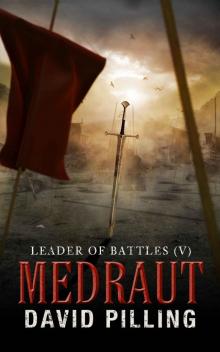 Medraut
Medraut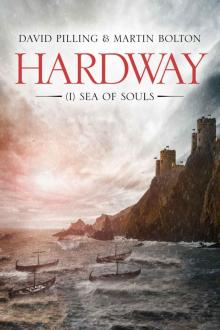 Hardway
Hardway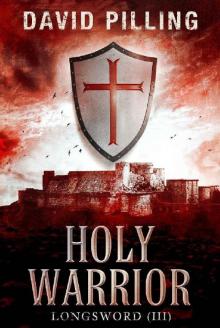 Holy Warrior
Holy Warrior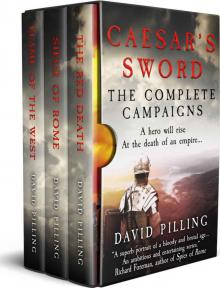 Caesar's Sword: The Complete Campaigns
Caesar's Sword: The Complete Campaigns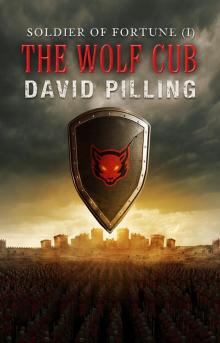 The Wolf Cub
The Wolf Cub Reiver
Reiver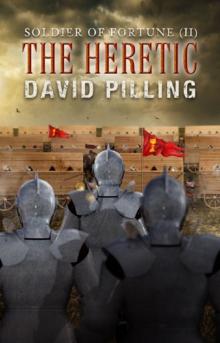 The Heretic
The Heretic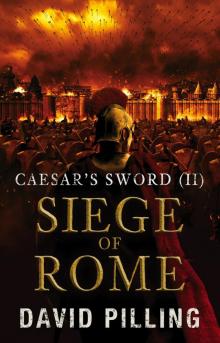 Siege of Rome
Siege of Rome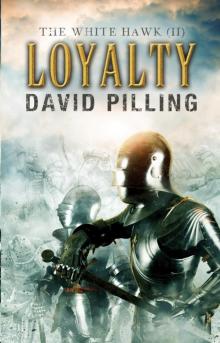 Loyalty
Loyalty The Path of Sorrow
The Path of Sorrow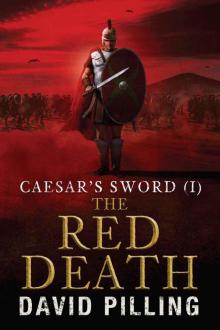 Caesar's Sword (I): The Red Death
Caesar's Sword (I): The Red Death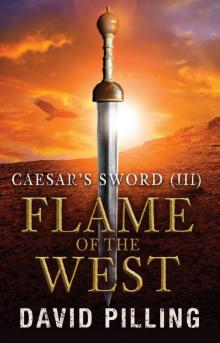 Flame of the West
Flame of the West The Best Weapon
The Best Weapon Sacrifice
Sacrifice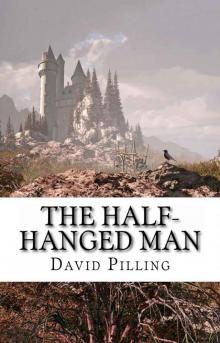 The Half-Hanged Man
The Half-Hanged Man